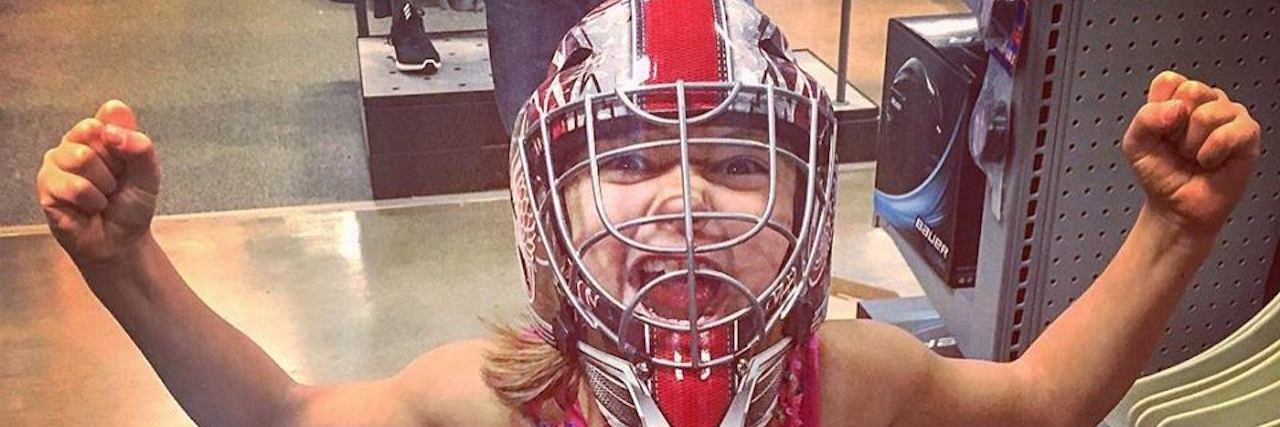My daughter has deep chocolate brown eyes that are almond-shaped and totally captivating. Her nose turns up slightly at the end, just like mine, and scrunches up when she’s excited. She has sweet rosebud lips that haven’t changed one bit since she was an infant. She is fiery, passionate, wildly imaginative, and full of joy. She’s also on the autistic spectrum.
She had a relatively “normal” childhood. Crawled, teethed, walked, talked all around the “typical” time children do those sorts of thing. As she got older, I noticed she had some “quirks” — she attached to certain movies and would ask to watch them over and over again for months. She lined her toys up or would choose toys that looked the same. She craved and thrived within routine. She had an abundance of imaginary friends and would make up words and songs that sounded like gibberish. I laughed them off at the time, even though I was in early childhood education and every sign should have been like a neon light on a dark highway. When I look back now, I want to shake myself for not looking into diagnostics earlier, but that would have put us on a different path and I’ve grown to love the way we’re going.
Her diagnosis journey started at the beginning of this year. Her teacher gently guided us toward that path as we saw her ability to focus and participate and stay at grade level diminish through kindergarten and first grade. We were referred for assessment by her pediatrician, who said he “felt comfortable diagnosing her with ADHD,” but that didn’t sit right with her dad and me. There was something else going on below the surface that wasn’t encompassed by ADHD. We did the pre-screen, then the full screening and assessment, and finally got the diagnosis paperwork in the mail. Looking at her diagnosis was like holding fire: powerful and terrible. I knew it meant help and I knew it meant understanding, but it also felt like our lives were thrown into never-ending flux. At the time it felt none of us would ever be the same, most of all, my precious daughter.
I struggled for weeks wrapping my brain around what I now believe I knew all along but avoided. My boyfriend kept reassuring me, “This doesn’t change her. She’s going to keep being herself. It just helps us understand her.” I wondered every other day if I made the wrong choice by getting her evaluated. I would watch her and bore into her with all the research and articles and parent blogs I was reading. She became less my child and more my project. I cycled into a depth of what I can only label as my own personal psychosis trying to reconcile waiting so long and missing that precious three year window, to cursing myself for ever want to get her tested and placing a label on her forehead for all the world to see for the rest of her life.
One day, a couple of weeks before second grade started, I stopped to ask her how she felt about everything. We’d been really transparent with her and had spoken honestly to her every step of the way. She responded, “I feel scared.” I asked her why, and she said, “Because I don’t want to be autistic. I just want to be me.” My brain became an avalanche. Every line of every article, every piece of advice from every other autistic parent, every second guess came crashing down. She had just said to me exactly what I needed to hear, and through tears, I managed to choke out, “And that’s what you are and always will be. This doesn’t change you; it only helps us to understand you and help you live the best possible life we can give you.”
That moment changed us and the way we interact with her diagnosis. I made a promise to myself that I would hear her first instead of looking to internet research and blogger moms for advice on how to raise my child. It’s her life, after all. She should have the first say about what she needs.
Things are leveling out. We’ve been working with a support specialist that really appreciates my daughter and her differences and personality. We talk about autism when she wants to talk about it. If I have to talk to someone about her, for a class, team or event, I make sure to ask her first, to see if she wants to be the one to explain it herself. Sometimes, she hides behind me. Sometimes, she steps forward in bravery and owns her autism. I’m incredibly proud of her and the steps she has taken and is taking every day to grow into herself fully.
I know there are going to be days (and there have been plenty already) when it’s going to be hard. In the midst of that, however, I know that my daughter and I will get through this, and we’ll do it together.

